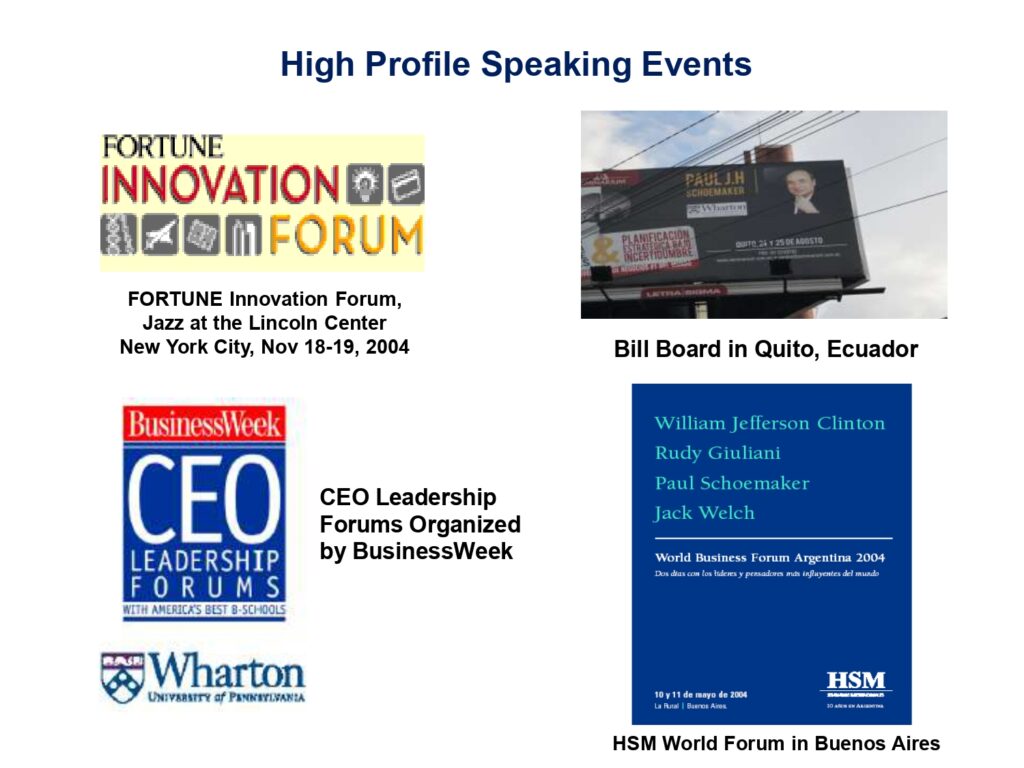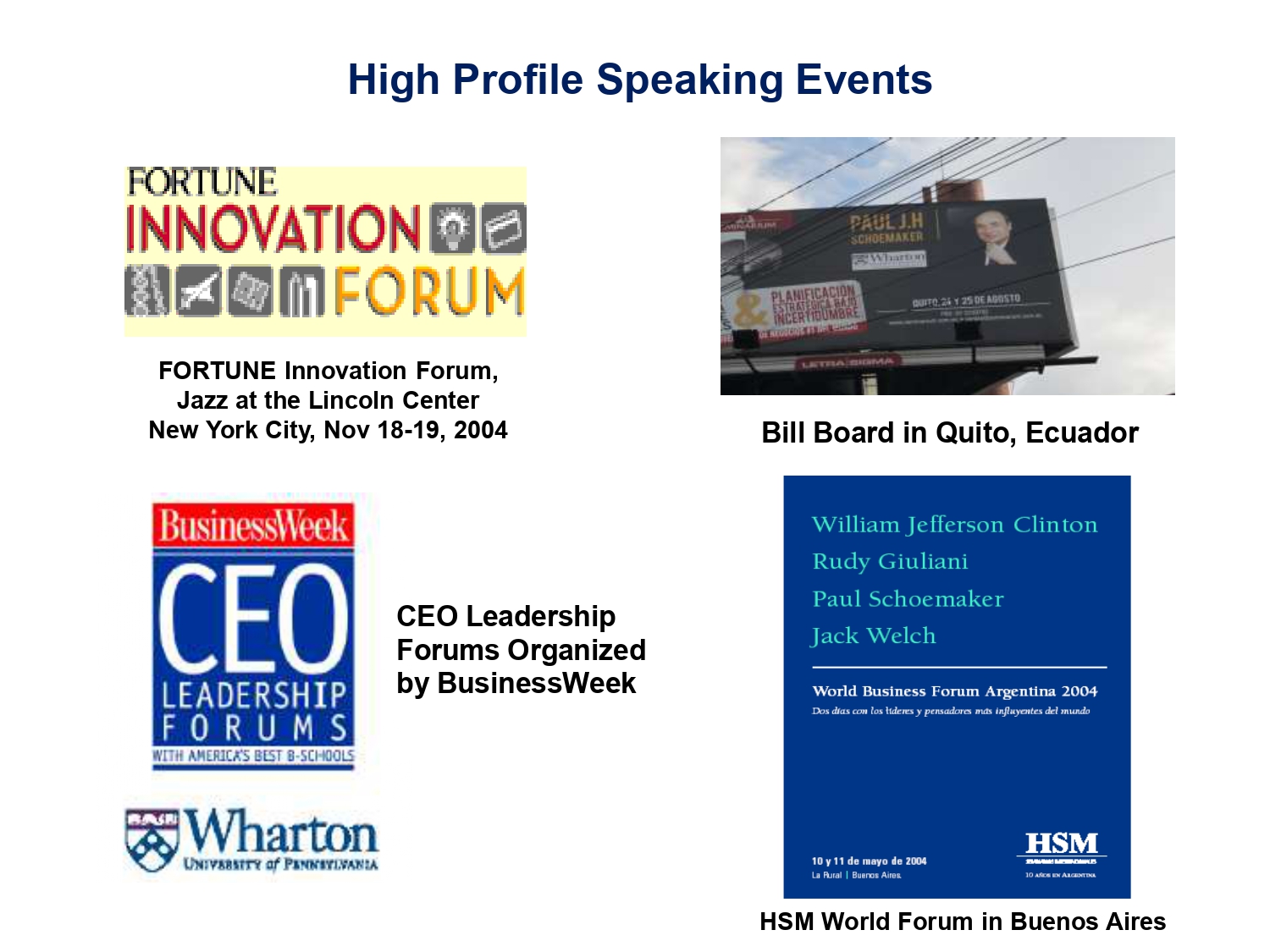Paul J.H. Schoemaker, Ph.D., is an accomplished entrepreneur and leader of new ventures. He was the founder of several companies, invested in over ten technology start-ups, and served on the board of several of these. The two ventures described below especially drew on Paul’s own research and expertise, with close guidance by him. In addition, he has personally advised over a hundred larger organizations through his lectures or personal consulting and influenced many more managers through his articles or books.
Decision Strategies International, Inc. (DSI) was founded in 1990 by Paul J.H. Schoemaker and colleagues to improve the quality of strategic thinking and decision-making in organizations. The company was sold 25 years later to Heidrick & Struggles to scale it further into a world-class consulting practice in strategic leadership. Paul was Executive Chairman and majority shareholder when DSI was sold. He did not personally join Heidrick & Struggles but helped support the corporate transition.
DSI’s original focus was scenario-based strategy consulting, executive development, and training. The firm developed a select network of strategic alliance partners and forays into multimedia software development. DSI offered clients advice on how to better navigate uncertainty through future mapping, flexible strategies, and dynamic monitoring. The company’s partners serve hundreds of clients worldwide, from large to small and profit to non-profit. Numerous clients retained DSI beyond the initial engagement, fostering long-lasting client relationships and strong market acceptance of its services. DSI’s primary business sectors were health care, financial services, energy, media, government, and some consumer goods companies.
Since its start, DSI has drawn heavily on advanced decision research conducted by Paul and others in decision sciences and strategy at the University of Chicago, the Wharton School, and other leading research institutions. Over time, DSI added additional services to its consulting and training offerings, especially in the areas of strategic leadership development and organizational transformation. After 15 years as Chairman and CEO, Paul invited Scott Snyder to run the company and thereafter Steve Krupp, with each serving five years as CEO. Throughout, Paul remained active as Executive Chairman and orchestrated a successful DSI exit by selling all to Heidrick & Struggles.
Q2 Tech is a private research venture founded by Paul Schoemaker in 2020 to explore how organizations can better blend soft and hard analyses in their decision-making and planning systems. Q2 Tech has created various problem-solving methodologies (see chart below) that client teams can license, operate, and refine themselves based on proprietary templates. At present, Q2 Tech is focused on developing conceptual platforms and tool blueprints in order to develop them further with corporate clients and strategic partners, using pilot projects and joint ventures.
Q2 Tech’s methodologies are proprietary and draw on such fields as decision modeling, behavioral decision theory, predictive analytics, and artificial intelligence. These and other emerging technologies jointly underpin platforms in such management domains as strategic planning, decision making, innovation, and business intelligence. The primary benefits to client organizations are better decisions, cost reductions, shorter cycle times, self-improvement, and continual team learning. Such investments in firm-specific human capital will, over time, grow and renew themselves, with declining reliance on outside consultants.
As laid out in Paul’s MIT Sloan Management Review article with Phil Tetlock1, the smartest enterprises of the 21st century will increasingly excel at blending the powers of computer modeling with a deeper understanding of the strengths and weaknesses of unaided human judgment. Intelligent enterprises today are being shaped by two distinct forces. The first is the growing power of computers, big data, model building, and algorithms that further improve operations research, econometrics, decision support, forecasting models, expert systems, and artificial intelligence (AI). The second force is our growing understanding of common frailties in human judgment, reasoning, and choice. Decades of behavioral research have yielded deep insights into what humans, teams, and organizations do well or poorly.2
1 Schoemaker, Paul J.H. and Philip E. Tetlock, “Building a More Intelligent Enterprise,” MIT Sloan Management Review, Vol 58, No 3, Spring 2017, pp 28-37 and Schoemaker, Paul J.H., Sohvi Heaton, and David Teece “Innovation, Dynamic Capabilities, and Leadership,” California Management Review, 2018, Vol. 61(1) pp 15-42.
2 See Daniel Kahneman, Thinking: Fast and Slow, Farrar, Straus Giroux 2011, as well as Paul’s book Winning Decisions with J. Edward Russo.
The organizations below are some that Paul has worked with personally as a presenter, adviser, consultant, or board member. Yet others have to remain confidential for now.
Paul co-produced numerous publications aimed at bridging theory and practice, with an emphasis on leadership challenges and solutions approaches. The chart below, taken from his book Winning the Long Game with Steve Krupp, shows the six elements he often addresses in the publications below.

Paul received various awards and grants for work that bridges research and practice. These include chronologically:

Additional articles and videos can be found by keying in Paul Schoemaker at:
Paul received various awards and grants for work that bridges research and practice. These include chronologically:
